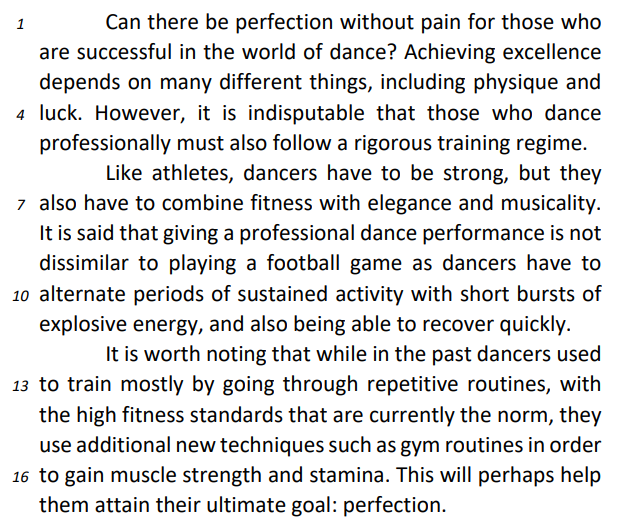Questões de Inglês - Passado simples | Simple past para Concurso
Foram encontradas 203 questões
Text for the question.
The route to perfection

Read the two cartoons and answer questions.

Planet’s ocean-plastics problem detailed in 60-year data set
Researchers find evidence of rising plastic pollution in an accidental source: log books for planktonmonitoring instruments. Matthew Warren
Scientists have uncovered the first strong evidence that the amount of plastic polluting the oceans has risen vastly in recent decades — by analysing 60 years of log books for plankton-tracking vessels.
Data recorded by instruments known as continuous plankton recorders (CPRs) — which ships have collectively towed millions of kilometres across the Atlantic Ocean — show that the trackers have become entangled in large plastic objects, such as bags and fishing lines, roughly three times more often since 2000 than in preceding decades.
This is the first time that researchers have demonstrated the rise in ocean plastics using a single, longterm data set, says Erik van Sebille, an oceanographer at Utrecht University in the Netherlands. “I’m excited that this has been finally done,” he says. The analysis was published on 16 April in Nature Communications.
Although the findings are unsurprising, long-term data on ocean plastics had been scant: previous studies looked mainly at the ingestion of plastic by sea creatures over shorter timescales, the researchers say.
Fishing for data
CPRs are torpedo-like devices that have been used since 1931 to survey plankton populations, by filtering the organisms from the water using bands of silk. Today, volunteer ships such as ferries and container ships tow a fleet of CPRs around the world’s oceans.
(…)Each time a ship tows a CPR, the crew fills in a log book and notes any problems with the device. So Ostle and her colleagues looked through all tow logs from the North Atlantic between 1957 and 2016, to determine whether plastic entanglements have become more common.
Evidence analysis
(…)Van Sebille says that because the study focused on large plastic items, it doesn’t reveal much about the quantity of microplastics — fragments fewer than 5 millimetres long — in the oceans. These tiny contaminants come from sources such as disposable plastic packaging, rather than from fishing gear.
Nevertheless, he adds, the study demonstrates that fisheries play a major part in plastic pollution, and will provide useful baseline data for tracking whether policy changes affect the levels of plastic in the oceans. “As fisheries become more professional, especially in the North Sea, hopefully we might see a decrease,” he says.
Source: https://www.nature.com/articles/d41586-019-01252-0 (adapted).
Access: April 20th, 2019
TEXT II
What to Know About the Controversy Surrounding the Movie Green Book
Depending on who you ask, Green Book is either the pinnacle of movie magic or a whitewashing sham.
The film, which took home the prize for Best Picture at the 91st Academy Awards, as well as honors for Mahershala Ali as Best Supporting Actor and Nick Vallelonga, Brian Currie and Peter Farrelly for Best Original Screenplay, depicts the burgeoning friendship between a black classical pianist and his ItalianAmerican driver as they travel the 1960s segregated South on a concert tour. But while Green Book was an awards frontrunner all season, its road to Oscar night was riddled with missteps and controversies over its authenticity and racial politics.
Green Book is about the relationship between two real-life people: Donald Shirley and Tony “Lip” Vallelonga. Shirley was born in 1927 and grew up in a well-off black family in Florida, where he emerged as a classical piano prodigy: he possessed virtuosic technique and a firm grasp of both classical and pop repertoire. He went on to perform regularly at Carnegie Hall— right below his regal apartment—and work with many prestigious orchestras, like the Chicago Symphony and the New York Philharmonic. But at a time when prominent black classical musicians were few and far between due to racist power structures, he never secured a spot in the upper echelons of the classical world. (African Americans still only make up 1.8 percent of musicians playing in orchestras nationwide, according to a recent study.)
Vallelonga was born in 1930 to working-class Italian parents and grew up in the Bronx. As an adult he worked as a bouncer, a maître d’ and a chauffeur, and he was hired in 1962 to drive Shirley on a concert tour through the Jim Crow South. The mismatched pair spent one and a half years together on the road — though it’s condensed to just a couple of months in the film — wriggling out of perilous situations and learning about each other’s worlds. Vallelonga would later become an actor and land a recurring role on The Sopranos.
In the 1980s, Vallelonga’s son, Nick, approached his father and Shirley about making a movie about their friendship. For reasons that are now contested, Shirley rebuffed these requests at the time. […]
(Source: from http://time.com/5527806/green-book-movie-controversy/)